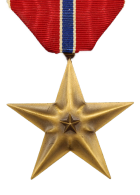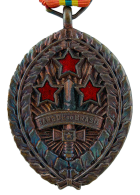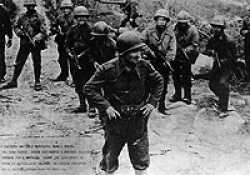Max Wolff Fiho was born in the town of Rio Negro, PR, Brazil, in July 29, 1912. In WWII he became a part of the 11th RI (Infantary Regiment) from the town of "São João Del Rey", MG, Brazil. I saw perfectly when the machine gun burst Sergeant's Max Wolff Filho chest. Instinctively he joined his hands on the belly and fell face down. He didn't move anymore. Lieutenant Otávio Costa, who was on my side in the Observation Post, pressed the teeth with force, but he didn't say a word. When I asked him if the man that had tumbled was Sergeant Wolff, he balanced affirmatively his head.
Less than one hour before I had been talking with the sergeant. I believe it was with me he talked privately for the last time. He spoke to me about his daughter, a ten year-old girl, that was in Brazil. He told me that was widower and he gave me news that your promotion to lieutenant, for bravery act, would not delay to arrive. And as I was picking up messages among the men of your Platoon, already in formation for the next patrol, Sergeant Max Wolff asked me that also sent one letter for him. He wrote a few lines in my notebook: “To my relatives and friends: I am doing well. To my dear little girl: Dad goes well and will return soon.”
The sergeant went out with your men for the ravines on the right, and we proceeded for the mountains of the north, face to face to the point the patrol should reach. We saw when the men appeared in the no-men land and proceeded cautious on the empty road. The sergeant had transformed your ammunition combs in a necklace that the Sun “set on fire with its light”. He took the helmet under the arm and the small Thompson pointing to the front. Our artillery, on the left, had ceased of throwing, and now it was a total silence. Lieutenant Otávio Costa told me: "It is not possible the Germans still there".
The first objective of the patrol was three houses, less than a kilometer from us and Sergeant Wolff's men reached it at 2:00 PM. The group surrounded the three ruined houses, and the sergeant pushed with the foot the door of one of them. We saw when he entered and sign to his men: the two spaced column started to walk again in the fields It was a very clear and sunny afternoon and something – a broken window-pane or an ammunition cartridge case – it was sparkling in the ruins of Montese.
At 2:30 PM, the patrol was less than 100 meters to reach the last objective: a group of houses located on a elevation. Sergeant Wolff gave his last steps ahead. Then a short and nervous laughter filled the silence of the valley and Sergeant Wolff fell face down on the grass. The other men bent over very fast, and the Germans began shooting, blocking our men throwing grenades and bursts out bullets from machine guns. The Germans launched later signing rockets, asking for fire from their batteries, and minutes later the projectiles from the German artillery whistled over us and exploded on the road traveled by the patrol. Lieutenant Otávio Costa gave the position’s coordinates to our mortars, and during more than one hour the duel continued, a fire dialogue.
Our mortars burst two kilometers beyond, where possibly it would be located the German batteries. The German obuses burst close, where our men continued stooping down or in the hill where we were in the Observation Post. Once in a while a machine gun burst cut the air, as a bad wind, disturbing the branches of the trees close by. One of those almost scraped our heads and pushed us inside a big hole, where we were close to one hour. We lifted our heads once in a while until the edge of the trench, but the mortars only gave us seconds: we listened their whistle in the distance, and jumped again into the foxholes before the explosion shacked everything.
When it was already dark, we left the beaten positions and reached the trenches of the rearguard. We arrived on the Command Post of the Battalion close to 7:00 PM. Minutes later also returned the men of Sergeant's Max Wolff Filho patrol but not him. When our men returned to the no-men land, to pick up the bodies and the wounded, the Germans received them with merciless bursts of machine guns. Many of the men who returned had watering eyes. One of them, Sergeant Nilton José Facion, from a town called São João del Rei, in Minas Gerais State, told me that history:
"I was about thirty meters from Sergeant Wolff when he was shot. Private Alfredo Estevão da Silva, who went first, turned to me and said: “it seems that Wolff is dead. I will go there to pull the body here”. I sad: I go with you, but a burst killed Private Estevão before he could sad anything. I got to drag the sergeant's body to about thirty meters. Then the burst of mortars came, and I could not proceed".
Later on Sergeant Alfeu Paula Oliveira (he also dried his humid eyes with his blouse) took me to the small compartment where Wolff kept his things: there was the decoration General Truscott had placed in Wolff’s chest a few days before, General Mascarenhas' citation; his daughter’s picture, of brilliant eyes as her father’s eyes. Everything now look misplaced. “This was a sad day for our Battalion. We lost a brave man.” told me Major Manuel Rodrigues Carvalho Lisboa.
He was first sepulted at the "Brazilian Militar Cemetery" located in Pistóia, Italy where all Brazilian soldiers were sepulted. Their bodies were exumated and transfered to Brazil in October 5, 1960 where they are now sepulted. Sgt. Max Wolff Filho ("Filho" means Son, so looks like his father had the same name....)
Source: Brazil in the 2nd World War - Editions of Gold - Joel Silveira.
Translated and adapted by Luiz Carlos W Vargas, Brazilian Army Reserve Officer










